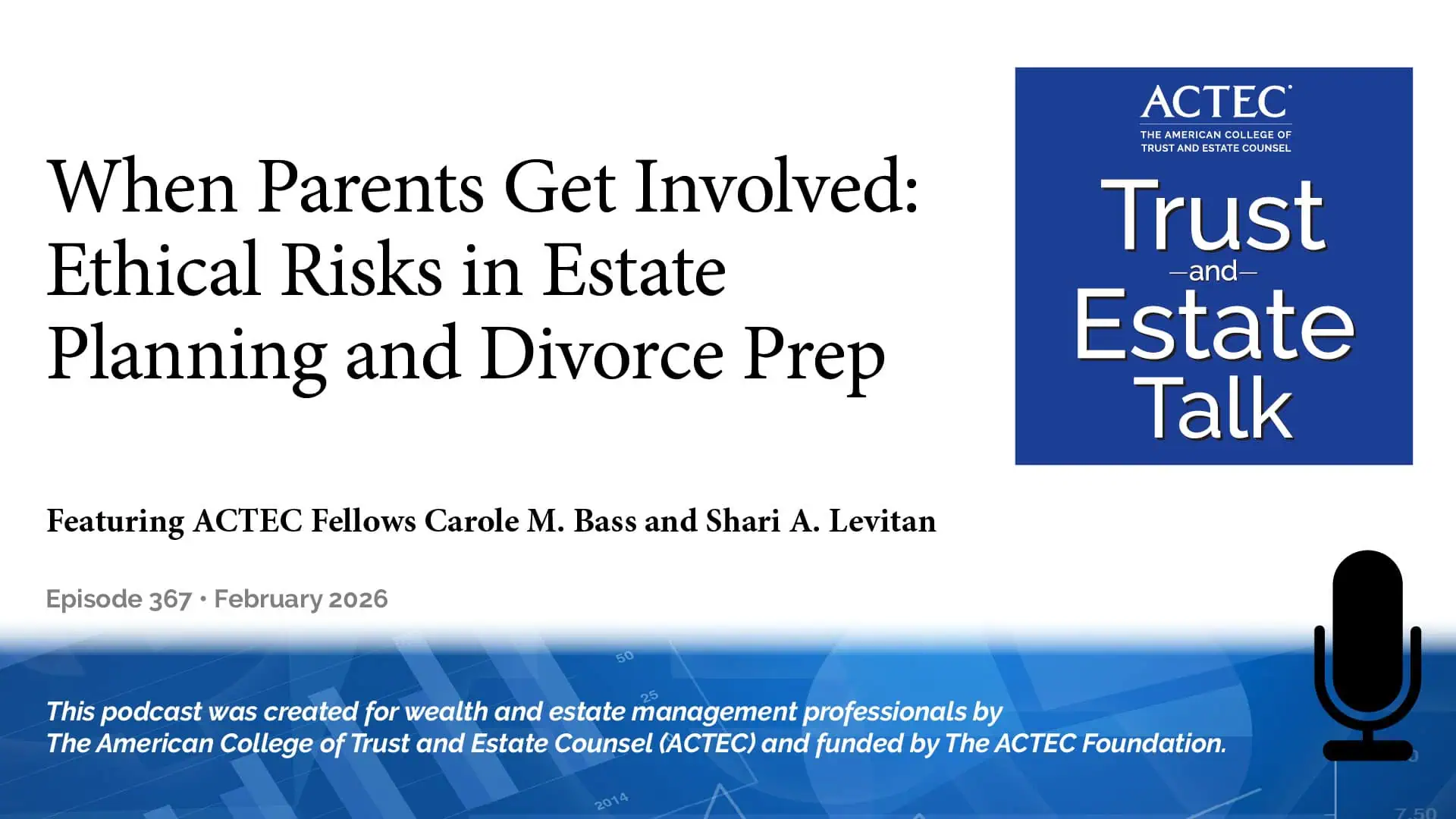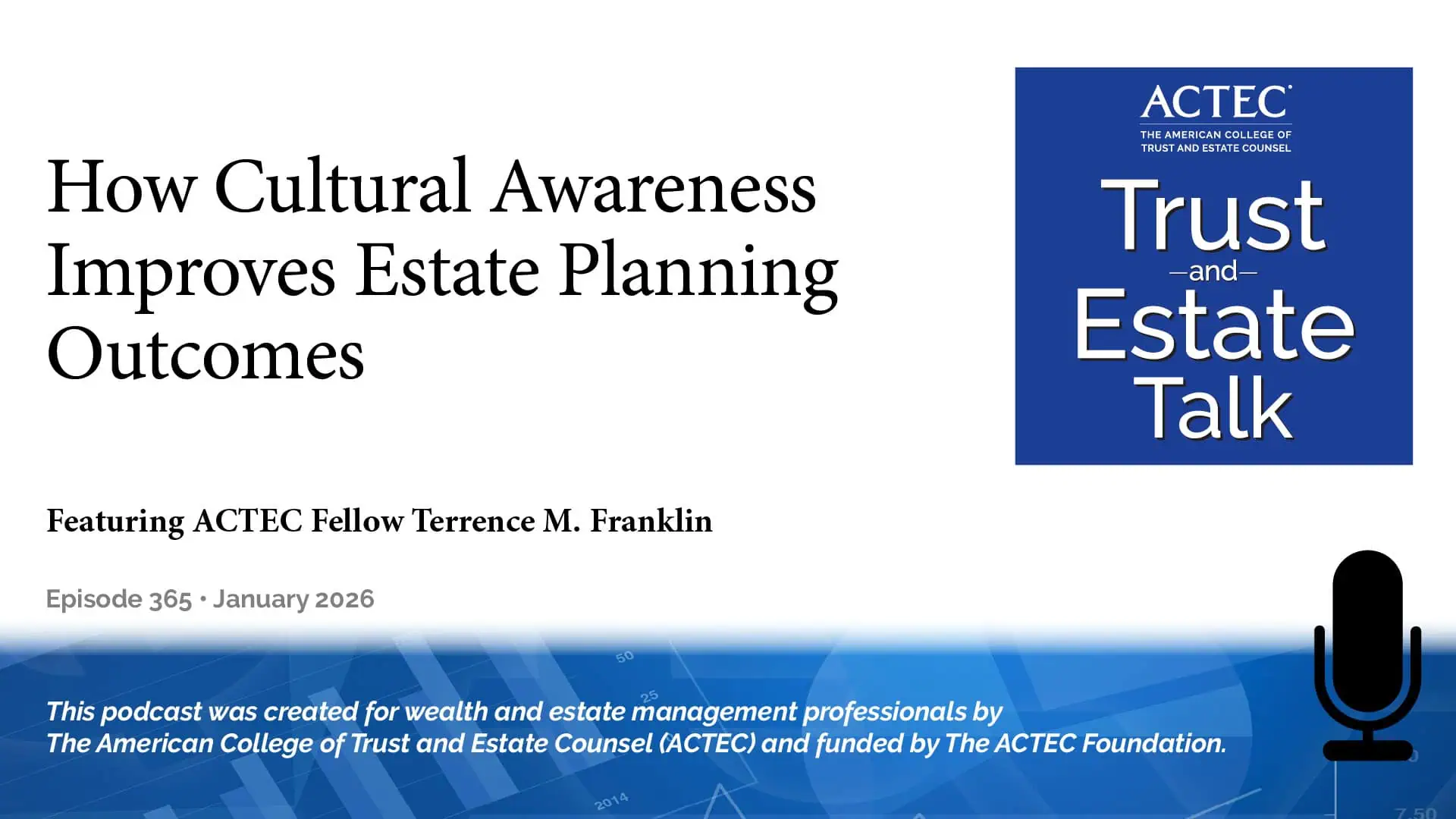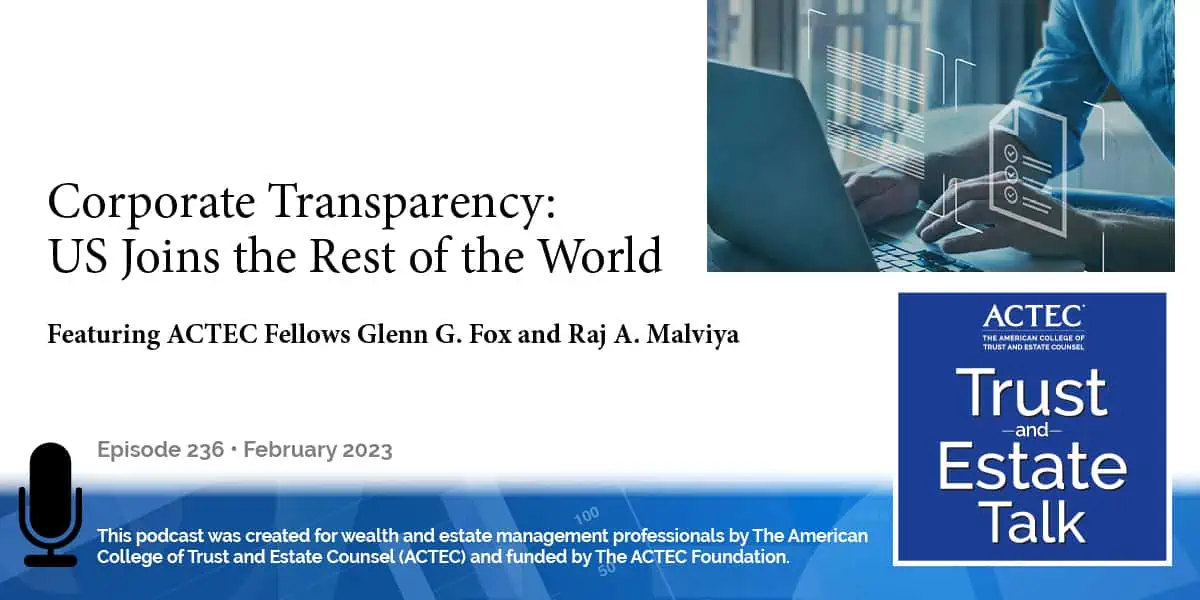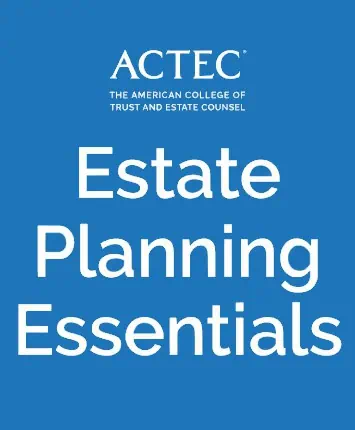Corporate Transparency: US Joins the Rest of The World
“Corporate Transparency: The U.S. Joins the Rest of the World,” that’s the subject of today’s ACTEC Trust and Estate Talk.
Transcript/Show Notes
This is Doug Stanley, ACTEC Fellow from St. Louis, Missouri. The Corporate Transparency Act was enacted into law on January 1, 2021, and final regulations were issued on September 29, 2022. It’s effective as of January 1, 2024.
All wealth-planning and tax practitioners will need to understand the compliance obligations under the act, which is mainly focused on requiring corporations, limited liability companies, partnerships and, indirectly, trusts to disclose information on their beneficial owners. ACTEC Fellows Glenn Fox of New York and Raj Malviya of Grand Rapids, Michigan, will offer their recommendations. Welcome, Glenn and Raj.
Glenn: Thanks so much. This is Glenn Fox. I’m joined by Raj and we are here today to give you what I call “an update on the Corporate Transparency Act.” We had done a previous podcast (An Introduction to the Corporate Transparency Act) when the Act had originally come out in early 2021, and we now have final regs that were issued in September – September 29, 2022. In a sense, the regs are going to be, I think, the bible for us to follow here. FinCEN, which is the Financial Crimes Enforcement Network, issued these rules, and they implement what is a bi-partisan act that Congress passed.
The rules are intended to enhance the ability of FinCEN and other agencies to protect U.S. national security and the U.S. financial system from illicit use of funds and provide essential information for national security. The information that’s provided by what are called “reporting companies” will only be available to law enforcement agencies. So, this is not what might be considered an open register of companies that anybody can access.
What we’d like to do is hit the highlights of where the Act is now based on the final regulations. So, I’ll first turn it over to Raj to explain how the reporting companies are treated under the Act, and reporting companies are the parties that need to do the beneficial owner reporting under CTA.
Corporate Transparency Act: Reporting Company Expectations
Raj: Thank you, Glenn. And just to reiterate, the final regs or rules that FinCEN has published are the bible here for applying the CTA to our practice. And we had final regulations issued on September 29, 2022. And the big picture is there were not many differences or changes from the final regulations compared to the proposed rules. In fact, the commentary that FinCEN has issued as part of its final regulation package admits and affirms that many of the proposed rules have remained unchanged.
So, Glenn and I will focus on some of the key differences from the proposed rules and the final rules and what you need to know as we go through each of the components of the CTA methodically. So, the reporting company is the crux of what is a part of the CTA. Reporting companies need to accomplish the reporting, whether that’s through a designated person or agent on behalf of that reporting company. And we have two types of reporting companies, as we know – domestic and foreign. We’re going to focus on the domestic reporting companies for this discussion.
The reporting companies, as we know, are going to be entities that are created by the filing of a document with the Secretary of State or a similar office under applicable state law, and that includes Indian tribes. So, we know that most types of entities we work with in our practices are going to be covered under the CTA as a reporting company. Now, thankfully, there are 23+ exemptions to the definition of a reporting company and most of those exemptions are designed to exclude those entities and companies that are highly regulated already.
Large corporations, banking and financial institutions, credit unions, public accounting firms, and tax-exempt organizations all have their own system and regime that already apply to regulation, so those are excluded. Most of the entities that we work with as private client professionals are going to be covered under the scope of a reporting company definition without exception. In addition – as Glenn will talk about in a moment – trusts, which are near and dear to our hearts as private client practitioners, are not directly reporting companies. The only exception would be a business statutory trust – the type of trust that would require a state filing to be formed.
But all trusts, as we know, outside of that do not require state filing. However, the beneficiaries of a trust could potentially be brought in as beneficial owners, which will need to be included as a part of the reporting company’s informational report to FinCEN. And the beneficial owners of a trust would be those in control. So, in addition to having a beneficial owner that meets the threshold of ownership from a percentage standpoint, there are also beneficial owners; deemed to be beneficial owners based on their control over the entity. And so, trustees on behalf of a trust that has ownership in a reporting company would be included under the “beneficial owner” definition. So, Glenn, tell us a little bit about beneficial owners and what we have to watch out for as reinforced under the final rules.
Corporate Transparency Act: Beneficial Owner Reporting
Glenn: Thanks, Raj. So, beneficial owners, which are the object of the reporting company, those are the individuals who have to be reported. Under the rule, which is the final regulation, any beneficial owner would include any individual who directly or indirectly either exercises substantial control over the reporting company. They may have no equity, but they’re still considered a beneficial owner because they exercise substantial control. Or #2, they own or control at least 25% of the ownership interests in a reporting company.
The final regs define the term “substantial control” and the term “ownership interest.” And, in keeping with the CTA, the regs exempt five types of individuals from the definition of a beneficial owner. Meaning if you are, let’s say, for example, an agent of somebody or a nominee, people who are representing other true owners, we’re not looking to report the agent in this example. FinCEN and the CTA is interested in who is the actual owner of the company. Note – I said individual. So, in the case of a trustee, let’s say a trust owns an interest in a reporting company, and that reporting company effectively is held by a fully discretionary trust.
The trustee would be the party that is reported as the beneficial owner, but then the question is, okay, if you have an individual trustee, that’s pretty simple. That individual trustee reported. But what if you have a corporate trustee? Who gets reported in that case because we’re looking for an individual who, directly or indirectly, has substantial control? I think most folks are going to expect that there’s going to be some individual person at the trust company that will end up being the party reported, but it’s not clear from the final regs as to whether you have to include any other people who are working at the trust company and have some type of substantial powers with respect to the trust.
The final regs set forth the range of activities that could constitute substantial control, and it captures anyone who can make important decisions on the entity. You can imagine if you’re dealing with a trust company, that you could have different people at the trust company who could be making decisions. FinCEN’s approach is designed to close loopholes, but I’d say that there are still quite a few loopholes that are outstanding. The final regs also provide standards and mechanisms for determining whether somebody has, owns or controls a 25% interest in the company.
And among other things, these standards address how a reporting company should handle a situation where ownership interests are held through a trust. So, let’s say that you do have a trust and we’ve determined how the trustee is treated and how the reporting company reports the trustee. But we also have beneficiaries. Do they get reported? Well, the standards in the regulations say that if a beneficiary has a right to demand income or receives all the income or has a right to withdraw all the assets in the trust, the beneficiary is reported as a beneficial owner in addition to the trustee.
We believe, based on the commentary, the preamble to the regs, and the way the regs themselves are written, that if you have a fully discretionary trust, the beneficiaries should not have to be reported as beneficial owners. Raj, why don’t you take up with company applicants?
Corporate Transparency Act: Recorded Company Applicants
Raj: Thank you, Glenn. So, we had sort of a deer-in-headlights reaction when the proposed rules came out because a company applicant also has to be included in the reporting by a reporting company to FinCEN in addition to beneficial owners. Company applicants are those individuals, like beneficial owners defined as an individual, who directly files the document that creates the entity in the first place.
And in the proposed rules, interestingly and surprisingly, these applicants could go back as far as possible in time with no limitation and it could be as many applicants as possible. So, you’ve got a law firm with a partner who directs an associate who then, in turn, directs a paralegal to file the articles of organization. You’ve got three applicants there. So, what the final rules did was provided some relief, and we all breathed a sigh of relief, was limit the number of applicants to essentially two.
The actual individual who files the document that creates the entity and then the individual who was sort of controlling that process in a nutshell. And we also have a duration here. We only have to report company applicants beginning after the effective date, which is going to be January 1, 2024. So, those entities formed after that date will need to include company applicants on the FinCEN filing by the reporting company. So, Glenn, quickly tell us about what these beneficial ownership information reports are supposed to include and what type of system is going to be in place.
Corporate Transparency Act: Information Requirements of Beneficial Owners
Glenn: Right, so that’s probably, in some ways, the most – where there is the most clarity both in the statute and in the final regs. When filing a beneficial ownership report with FinCEN, the reporting company is required to identify itself and report four pieces of information about each of its beneficial owners. It’s their name, birthdate, address, and unique identifying number and issuing jurisdiction from an acceptable identification document. And an image of that document needs to be provided.
So, you actually could provide your driver’s license or your passport, and that would be sufficient. There’s also the ability to get a unique FinCEN number issued to you. The rule requires that reporting companies created after January 1, 2024, provide this information within 30 days of their formation. If they’re formed prior to January 1, 2024, they have till January 1, 2025, to file the initial information.
So, old and cold companies have a bit of a reprieve from having to file their initial report. And keep in mind that once you file the report, unless there are changes to the identifying information of your beneficial owners, you’re done. But obviously people move, so their addresses change. I guess their names could change if they get married. But, other than that, the information will not change in terms of – if you’re staying in the same place – and so hopefully, for many smaller companies, it’s not something that has to be done more than once.
Concluding Thoughts: Corporate Transparency Act Final Regulations
Raj: Thank you, Glenn. I think, in just 10 seconds, we can wrap up. And really, the CTA is here. The final rules are here, and everything is going to become effective on January 1, 2024. While that seems like there’s plenty of time to prepare, it really isn’t. And I think we, as practitioners, need to make sure, internally and externally, we are doing everything we can to be ready for this reporting with FinCEN.
Pay attention. Entities created before the effective date because different timing rules will apply on when the reporting needs to happen with FinCEN, and then obviously, those new entities formed after January 1, 2024, will have a very tight timeframe. The 30 days, 30 calendar days, to get the information reported to FinCEN. Any other closing comments, Glenn?
Glenn: No, I think you’ve summed it up well. More to be discussed as this develops.
Doug: Thank you, Glenn and Raj, for helping us better understand the compliance obligations under the Corporate Transparency Act.
You may also be interested in:
- The Corporate Transparency Act: The Clock Has Started – October 2022
- An Introduction to the Corporate Transparency Act (CTA) – May 2022
This podcast was produced by The American College of Trust and Estate Counsel, ACTEC. Listeners, including professionals, should under no circumstances rely upon this information as a substitute for their own research or for obtaining specific legal or tax advice from their own counsel. The material in this podcast is for information purposes only and is not intended to and should not be treated as legal advice or tax advice. The views expressed are those of speakers as of the date noted and not necessarily those of ACTEC or any speaker’s employer or firm. The information, opinions, and recommendations presented in this Podcast are for general information only and any reliance on the information provided in this Podcast is done at your own risk. The entire contents and design of this Podcast, are the property of ACTEC, or used by ACTEC with permission, and are protected under U.S. and international copyright and trademark laws. Except as otherwise provided herein, users of this Podcast may save and use information contained in the Podcast only for personal or other non-commercial, educational purposes. No other use, including, without limitation, reproduction, retransmission or editing, of this Podcast may be made without the prior written permission of The American College of Trust and Estate Counsel.
If you have ideas for a future ACTEC Trust & Estate Talk topic, please contact us at ACTECpodcast@ACTEC.org.
© 2018 – 2026 The American College of Trust and Estate Counsel. All rights reserved.
Latest ACTEC Trust and Estate Talk Podcasts

When Parents Get Involved: Ethical Risks in Estate Planning and Divorce Prep
When parents join prenup or divorce planning, ethical risks follow. ACTEC Fellows explore privilege, conflicts, and protecting the attorney-client relationship.

Useful But Overlooked Trusts: A Planner’s Guide to When and How to Use Them
Explore overlooked trusts—including HEETs, alimony, voting, and blind trusts—and when estate planners should use them to address complex client needs.

How Cultural Awareness Improves Estate Planning Outcomes
How cultural awareness improves estate planning outcomes, with insights on the racial wealth gap and strategies for more effective, inclusive client guidance.



